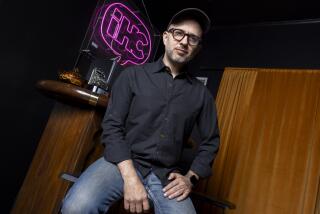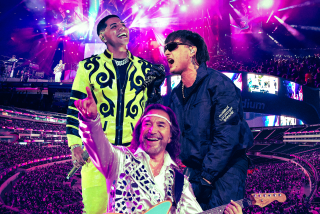From Roxy to Raji’s, Bands Pick the Best Sites for Sounds
- Share via
Bass guitarist Mike Watt of Firehose has seen clubs, halls and theaters come and go during his 10 years on Los Angeles stages, but losing the John Anson Ford Theater was especially painful.
“That place was happening,” Watt said mournfully of the Cahuenga Boulevard amphitheater just east of the Hollywood Bowl--which discontinued its summer rock concert schedule last June because of complaints by neighbors of traffic and noise and charges by the Hollywood Bowl that the concerts interfered with their programs.
A fixture of the local music scene since he helped form the Minutemen in 1978, Watt is one of more than a dozen Los Angeles-based musicians asked to name their favorite live music venue on the Westside and in the San Fernando Valley.
Watt insists that the John Anson Ford Theater, if still open, would be his first choice, though he says he experienced firsthand the conflicts the outdoor rock ‘n’ roll stage had with its larger, more famous competitor.
“It was outdoors and it had great sound,” Watt recalled. “But we had problems with the Hollywood Bowl. They made us stop playing. Mel Torme was getting upset. We were bogarting his gig.”
The Los Angeles area may be minus one musician’s paradise, but as active local artists will testify, there are still some gems out there.
One place Watt enthusiastically endorses is tiny BeBop Records on Sherman Way in Reseda, because it’s small and accessible to anyone who wants to play. But with all things considered, the bassist favors the Sunset Strip.
“For most gigs, I think the Roxy is probably the best place still going,” Watt decided. “Everybody gets to see you, and you ain’t too far away from the crowd. That’s really rock ‘n’ roll--with the dude right in your face.”
The Untouchables, Los Angeles mainstays for the last eight years, also value the Hollywood club. “The Roxy is definitely our favorite,” said the group’s lead guitarist, Clyde Grimes Jr. “There’s something intimate about it. It’s really hot and sweaty. It has just enough people to make it exciting.”
Since opening in 1973, the Roxy’s location, size (a capacity of just over 500) and tradition have made it perhaps Los Angeles’ most popular stage. Firehose and the Untouchables began their careers in the more punk rock-oriented era of the late 1970s and early 1980s, but during the last couple of years, the Roxy has proved its broad appeal by becoming a club desired by not only seasoned veterans of the Strip, but also by a new crop of hard rock/heavy-metal bands.
“Sometimes I think fans like the show more just because it’s at the Roxy,” said Tony Palacios, lead guitarist of Guardian, a heavy metal group.
Hard rockers Juliett have been playing together for less than two years but already think they’ve found Los Angeles’ hottest spot in the Roxy. “We play the Roxy once a month,” said Juliett’s Greg Pecka. “The other clubs are nowhere near as nice.”
Singer Danny Simon fronts Jailhouse, a band that’s an all-star collection of local hard-rock musicians. “The Roxy is good because it’s bigger than the other Sunset Strip clubs like Gazzari’s and the Whiskey,” he said. “There’s a cool atmosphere from the audience to the band that creates a lot of energy. The audience is right in your face.”
Though intimacy is important, Simon said Jailhouse also likes Reseda’s Country Club, a larger venue with a capacity of 910. “The Country Club is not as warm as the Roxy, but it’s great, especially the size of the stage and the lighting.”
“The Roxy’s like a condensed version of the Country Club,” said Lizzy Borden, leader of the heavy-metal group of the same name. “The Roxy’s a nice place to play, but the Country Club is No. 1. It has probably the biggest stage of all the L.A. clubs. It’s the best of both worlds--except for alcohol.”
Borden’s reference is to the Country Club’s loss of its permit for on-site consumption of alcoholic beverages, a problem that puts the popularity of the nightspot in jeopardy. The County Club’s operations manager, Scott Hurowitz, said that while they attempt to re-obtain the permit, the club is determined to prevent the no-liquor rule from damaging its status with local musicians. (The permit was not renewed by the L.A. City Council in November because of complaints of noise and vandalism at the club.)
“Bands are finding that they don’t need alcohol to draw fans,” said Hurowitz, 39. “They like to know that people are coming to see them, not just to party.”
Bad Religion’s Brett Gurewitz said his group favors the Country Club partly because the audience includes many underage fans who can easily frequent the dry environs of the Reseda establishment.
“We’re a punk band,” said Gurewitz, 27, “and we need to play all-ages shows, and the all-ages scene in Hollywood is virtually non-existent.” He added that the Country Club also draws a crossover audience of speed-metal bands, creating a sea of mohawks and long tresses that comprise the largest crowds in the history of the band’s nine-year existence.
“It’s our hottest venue,” Gurewitz said. “We get paid well, we get treated well and they have a decent sound system.”
Despite their ongoing popularity as favorite all-around clubs, the Country Club and the Roxy almost exclusively operate as pay-to-play venues, a process where the promoters rent the venue out, then have bands purchase and sell tickets to ensure enough paying customers will show up for the club to make a profit.
The Country Club’s Hurowitz strongly defended pay-to-play, insisting that without it, many places would close. “This whole thing revolves around ticket sales. If people don’t show up, we close. Then the bands have no place to play.
“We aren’t a nightclub,” continued Hurowitz, “and neither is the Roxy and other Sunset Strip clubs. We’re concert facilities, but too small to purchase national acts. It leaves us in the position where we have to use pre-sales to fill the place up to pay the rent.”
Gurewitz of Bad Religion says his band’s built-in following has prevented them from performing at the Country Club on a pay-to-play basis. “I don’t think we would ever do it, but we’ve been around a long time. Our fans will always show up.”
Hurowitz agrees, adding that though there have been punk pre-sale shows, the fierce loyalty of punk, thrash and speed-metal fans usually guarantees a full house. But they’re the exception.
“I wish all bands meant so much to their fans that people would come and pay $10 just because there’s so much excitement over them, but that’s not the case,” Hurowitz said.
Bigger is not always better to some. Ex-Plimsouls leader Peter Case has been strumming and humming on the local circuit since 1977, but he didn’t hesitate to voice his preference for McCabe’s, a small but well-equipped Santa Monica guitar shop that opens its back room for concerts, with an audience capacity of 150.
“I love McCabe’s,” said Case, who has performed under his own name since 1984. “It’s been a home club for me.”
Citing the sound quality and the enthusiastic audiences, Case has appeared at McCabe’s about 20 times. “And people you never see anywhere else play McCabe’s.”
After kicking around the local scene for about a dozen years, colorful folk singer Phranc also said McCabe’s is No. 1 with her.
“My favorite places to play are places where I can see everybody’s eyes, where it’s intimate,” said Phranc, who plays acoustic sets exclusively while decked out in her trademark brush cut and androgynous wardrobe. “McCabe’s is cozy, comfortable; it’s the best.”
Singer/guitarist Sylvia Juncosa, a one-time member of SWA and leader of the now-defunct To Damascus, has played acoustic and electric sets around Los Angeles since 1984 but hasn’t yet found the place that puts it all together.
“There’s always a weird contradiction. If there’s a good sound system, they might have a restrictive booking policy, or there’s a problem with the staff, or the people that go there think we’re too weird or underground,” Juncosa explained.
All the venues Juncosa enjoys share one significant quality: None of them are booked on a pay-to-play basis.
“I don’t think it’s morally right,” she said about pay-to-play. “I would never do it.”
Juncosa acknowledged that some of the better clubs now operate this way, though she said it puts a stigma on the acts participating. “When I see the names on the marquee of the Whiskey and the Roxy, I think of those groups as being really commercial metal bands.
“Pay-to-play just takes away from the music.”
If bands have to pay up front anyway, reasoned Juncosa, they might as well do everything themselves. “Sometimes it’s better to just rent a warehouse, send out flyers and put on a show. More people are doing that now.”
As a result, Juncosa prefers outdoor concerts to the indoor, nighttime variety. “I played the West Hollywood Street Festival two times, and those were my two favorite gigs.”
Like Mike Watt, Juncosa shares an affection for BeBop Records because of its raw, unpretentious sensibilities. “It’s small,” she acknowledged, “but it really has Bohemian qualities.”
Juncosa also has noticed the benefits of playing Hollywood’s Coconut Teaszer. “Usually you can get on a good bill at the Teaszer and people will show up, but the sound is horrible,” she said. But some perks can make up for disappointing audio. “They give you all this good food,” Juncosa said. “They take care of you.”
Another Coconut Teaszer fan is bassist Bruce Duff of the Jeff Dahl Group. Duff has had about 10 years experience playing in Los Angeles, including stints with 45 Grave, Jesters of Destiny and John Trubee.
“The Teaszer always has great bills, especially during the week,” Duff said. “It’s easy to draw there.” Duff added that the club’s specials, which he said sometimes include free beer and hot dogs, don’t hurt.
Falling James, 29, of the Leaving Trains named the gritty Hollywood Boulevard club Raji’s as his band’s venue of choice, but only because of an obvious process of elimination. “I guess Raji’s is our favorite since it’s the only place we haven’t been kicked out of,” James said.
The future of Leaving Trains is in doubt. James recalled that some of the group’s favorite shows were performed in the open spaces of Temesco Canyon when the group would plug its instruments into any available outlet and jam all night.
“We could play as long and as loud as we wanted,” he remembered. “We were only chased out a couple times.”
The Pandoras’ Paula Pierce said the Palace in Hollywood gets her vote. “It’s my favorite place because there’s space to move around,” said the leader of the all-female band known for its provocative shows. “There’s this big echo sound there I really like.”
According to Pierce, the L.A.-based Pandoras are dissatisfied with the local music community and don’t play the area as much as they used to, opting instead for out-of-town dates. Is pay for play an issue?
“L.A. is dead,” Pierce said. “There’s no kind of scene for us here.”
But despite occasional lapses, such as the closing of the John Anson Ford, Mike Watt still considers L.A. the place to be for music.
“I’ve been all over the country, and this is the best city for bands,” he said. “It’s more like vaudeville here; people with the spiel can just get up there and hoof it.
“People who don’t go to clubs are missing out. I think any band can get a gig here.”
Even one they like.
More to Read
The biggest entertainment stories
Get our big stories about Hollywood, film, television, music, arts, culture and more right in your inbox as soon as they publish.
You may occasionally receive promotional content from the Los Angeles Times.










